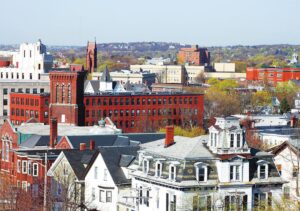Boston’s retail market is exceptionally healthy. A rising population combined with growing demand for space by boutique fitness concepts, quick-service restaurants and e-commerce brands looking for a physical presence is pushing up rents.
In turn, the vibrant retail scene makes urban living more desirable, furthering demand for housing in the metro area’s core. In Gateway Cities, however, retail vacancy presents a major challenge. Older buildings lack modern infrastructure and rarely conform to current codes. Convincing building owners to make costly upgrades is difficult. Strategies to improve and tenant these commercial properties is key to improving quality of life and stabilizing Gateway City neighborhoods.
Three Invaluable Tools
Fortunately, Massachusetts has little-known tools that are just right for this job.
They include the Massachusetts Food Trust (MFT), which works to increase access to healthy, affordable food in neighborhoods without supermarkets. Capitalized by the state with $1 million in 2018, MFT has provided grants to Stop and Compare Market in Lynn and Vicente’s Supermarket in Brockton. In terms of retail amenities that make housing more attractive, supermarkets take priority. Supporting their development in urban neighborhoods stabilizes home values and makes residents healthier to boot.
Diversity and creativity has long been an attractive asset that helps differentiate urban neighborhoods. The Collaborative Workspace Grant administered by MassDevelopment has helped Gateway Cities build on this strength.
In 2019, the program distributed $1.5 million in state capital funds, plus another $650,000 contributed by the Barr Foundation. Applicants can request seed grants of up to $25,000 to plan for a new collaborative workspace, or fit-out grants of up to $250,000 for building improvements and equipment purchases. From a coworking kitchen in Lynn to a creative retail incubator in Worcester, these dollars are activating storefronts in Gateway Cities across the state.

Joe Kriesberg
The Small Business Technical Assistance Grant Program is a third invaluable tool. Administered by the Massachusetts Growth Capital Corp., the program builds capacity in community-based organizations that provide technical assistance, education, and access to capital to local small businesses. Statewide, this program served over 3,600 entrepreneurs in 2019 with 61 percent people of color, 39 percent immigrants and 65 percent operating in low- or moderate-income communities. The work of these organizations is critical to building a strong pipeline of entrepreneurs to occupy retail spaces in Gateway Cities.
A Role for Real Estate Professionals
The development community’s help sustaining and expanding these three existing programs is key to improving the retail environment in Gateway Cities. But there are two more things real estate professionals can do.
First, look for creative ways to partner with cities to leverage MassWorks. This well-known grant program awards approximately $80 million annually for infrastructure improvements. The Baker administration has prioritized MassWorks funding for mixed-use redevelopment projects near existing public transit. These dollars can work in concert with the programs above to create vibrant retail districts and stronger urban neighborhoods.

Ben Forman
Second, encourage the Baker administration to revamp the state building code so it is easier to rehab older commercial buildings in markets where property values are low. As it stands now, bringing the whole building into full compliance with the modern code is generally cost-
prohibitive. There should be clear pathways to phase redevelopment, giving owners the ability to activate ground floor retail spaces before they address the needs of the entire building.
It’s easy to equate the lackluster retail environment in Gateway Cities today with the limited purchasing power of residents, but a short visit to the many thriving small businesses in these communities will demonstrate that this is a fallacy. Strong retailers will succeed in Gateway Cities given the chance. With the right strategy, sustained effort, and a little support from state government, there is no doubt that we can create many more opportunities.
Joe Kriesberg is president of the Massachusetts Association of Community Development Corporations and Ben Forman is research director at MassINC.




 |
| 

